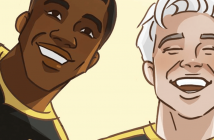I’ve never liked the word “earworm”––something too slithery about it––but the inspiration for the heroine of Sweet Black Waves came from a song that I just couldn’t get out of my head.
The first time I heard Loreena McKennitt’s ballad of “The Highwayman,” I was seventeen and the wistful melody immediately appealed to the romantic in me. The lyrics are taken from an early twentieth-century poem by Englishman Alfred Noyes and tells a story of tragic love.
Set in eighteenth-century England, a “highwayman”––or bandit––is in love with an innkeeper’s daughter named Bess. In an attempt to catch him, King George’s redcoats wait for a night they know the highwayman will be visiting his lady love. They burst into Bess’s inn, gag her, tie her to a bed and place the muzzle of a musket to her breast––putting her own finger around the trigger.
Bess is faced with an impossible choice: she can shoot herself and warn her lover away, or she can live and let him be captured and executed.
What would you do? Would you give your life to protect the one you love?
This conflict is at the root of the character who would eventually become Branwen, the heroine of Sweet Black Waves. I’ve listened to the song an infinite number of times over the past twenty years while writing other projects. Then, one day, as I was rereading the medieval legend of Tristan and Iseult, it suddenly clicked.
Princess Iseult’s handmaiden Branwen is often put in similarly impossible situations. I wanted to write a version of Branwen who showed the same grit and determination as Bess, the highwayman’s lover. As you may have guessed, Bess refuses to let the redcoats capture the man she loves. She “shattered her breast in the moonlight and warned him––with her death.”
At their last meeting, Bess had loosed her long, black hair around her lover as they embraced and he kissed the “sweet black waves in the moonlight.” Thus, I gave my Branwen similarly curly dark hair, and the title for her story took hold in mind.
 The sweet black waves in my debut novel also refer to the sea that surrounds Branwen’s kingdom, which my heroine both feels drawn to and fears because the waves bring enemy raiders to its shores. This push and pull is inspired by the bittersweet parting of Bess and the highwayman, the Gordian knot of love and death.
The sweet black waves in my debut novel also refer to the sea that surrounds Branwen’s kingdom, which my heroine both feels drawn to and fears because the waves bring enemy raiders to its shores. This push and pull is inspired by the bittersweet parting of Bess and the highwayman, the Gordian knot of love and death.
Despite Bess’s sacrifice, the highwayman dies trying to avenge her death. In the final stanza of the poem, however, we are told that on a still winter’s night hoofbeats can be heard on the moors as the ghostly lovers are reunited.
Throughout the many revisions of Sweet Black Waves and also now as I’m writing the sequel, I can sometimes get lost in the details of plot points and worldbuilding. Whenever I need to refocus on Branwen and the story I’m really trying to tell, I listen to “The Highwayman.” It’s my touchstone. Ideas can come from anywhere and my advice is that when you find the heart of your story, hold tight.



